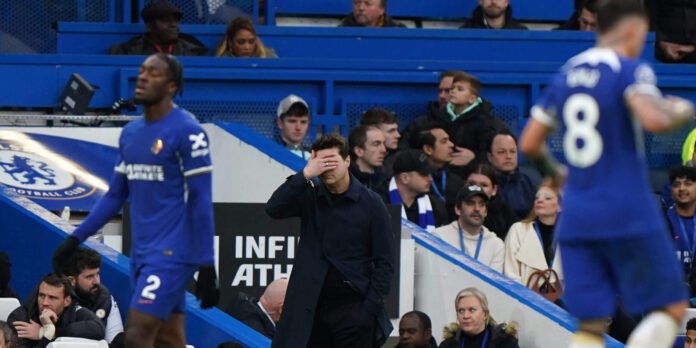Less than a year on from the sacking of Graham Potter, two defeats with eight goals conceded are all it has taken to drag Chelsea into the bottom half of the Premier League table and the project led by Todd Boehly and Clearlake Capital back under severe scrutiny.
Mauricio Pochettino and his players are now facing open hostility from their own supporters, and no one at any level of the club is safe from criticism or questioning. It is hardly the ideal preparation for a Carabao Cup final against league leaders Liverpool at Wembley this month.
From the head coach to the ownership, the players and the supporters, The Athletic takes a closer look at how Chelsea are dealing with this latest turbulence.
How is Pochettino dealing with the situation?
As each week goes by, the confident Pochettino who attended his first official press conference as Chelsea’s head coach back in July becomes more of a distant memory.
Unlike Potter, Pochettino has been able to convey his thoughts in media briefings in greater detail and with more personality. He has made valid points about what impact a long injury list has on a squad. Missing key individuals not only means you cannot work with your best players on a regular basis; it also has a detrimental effect on the lack of competition for places.
But there have been a few signs of the tension affecting him recently, with a couple of tetchy exchanges with journalists over questions they have asked.
The most recent of these came last week when it was highlighted that Pochettino’s points’ return was similar to that of the team’s last season. After the 4-2 loss to Wolves on Sunday, Pochettino’s Chelsea had 31 points from 23 top-flight games, just as at the same stage last term.
“Last season, I wasn’t here,” he snapped. “It’s 15 or 16 players that are different from last season. How can you compare? At the moment, we need to put it all in context. We need to put it all together — to build a team, it’s not a magic touch.”
Pochettino watches his Chelsea team unravel against Wolves (Jacques Feeney/Offside/Offside via Getty Images)
There is sound reasoning behind that argument. But there should also be signs of progress by now in the way the team is playing.
Unlike Potter, Pochettino benefited from having a full pre-season to work with the squad, plus fewer games in the absence of European competition.
And, despite the drip-feed of injuries, there has been a core group of players with whom to work for most of the campaign. Thiago Silva, Axel Disasi, Levi Colwill, Enzo Fernandez, Moises Caicedo, Conor Gallagher, Cole Palmer, Raheem Sterling, Mykhailo Mudryk and Nicolas Jackson have each made 19 Premier League appearances or more.
In that context, there should be signs of a plan coming together.
But arguably Chelsea’s best displays — the home draws against Liverpool, Arsenal and Manchester City — all came in the first three months of the season. Their worst, away at Newcastle, Manchester United, Middlesbrough and Liverpool, plus the home defeat versus Wolves, have all been in the last three months.
That indicates deterioration, not improvement.
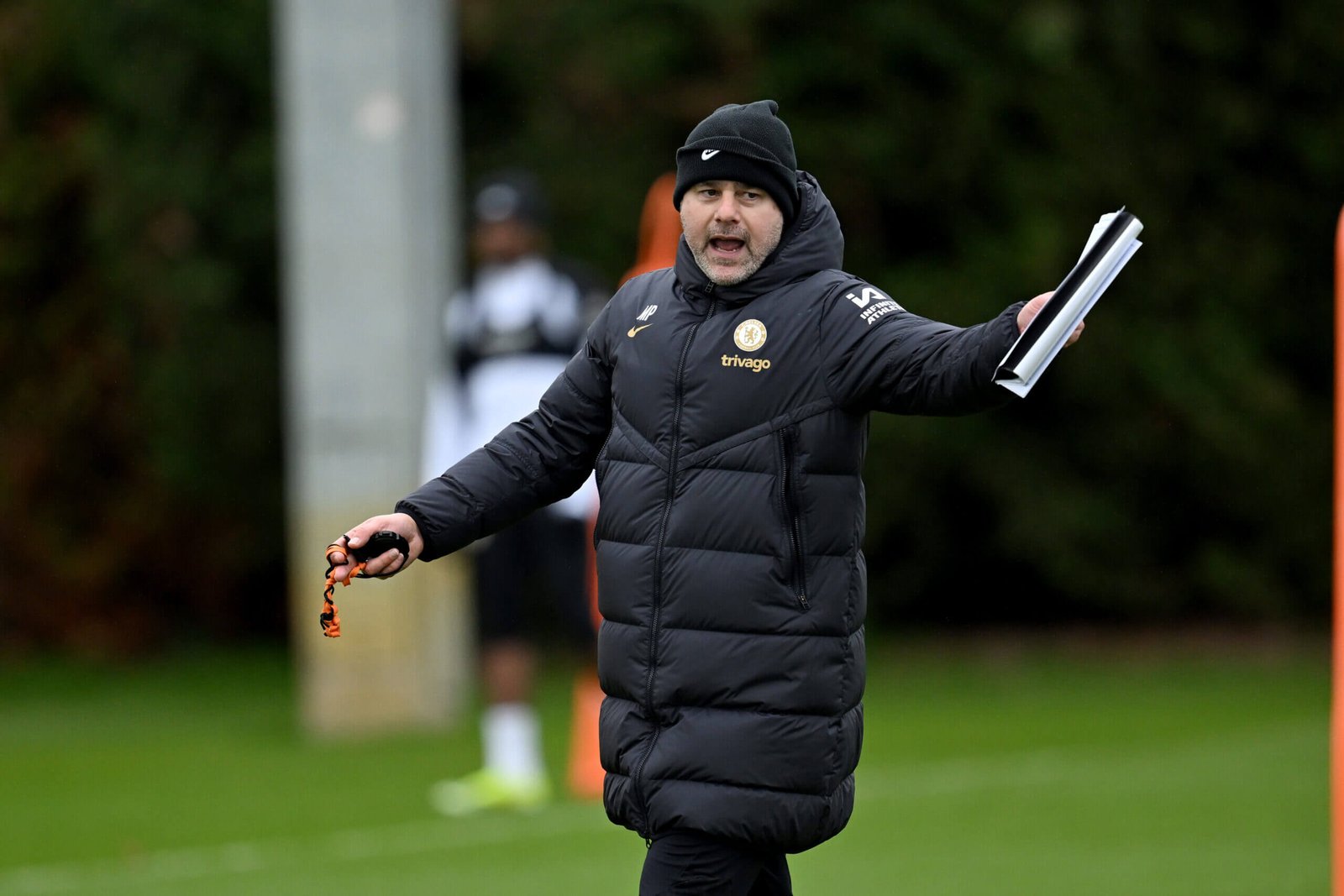
Pochettino directs a training session at Chelsea’s base in Cobham, Surrey (Darren Walsh/Chelsea FC via Getty Images)
Some sources close to the dressing room, speaking anonymously to The Athletic in order to protect relationships, have suggested coaching on tactical elements is limited and players are essentially playing off the cuff. Others insist this is not the case.
Then there is the in-game management.
Pochettino’s cause to win over the fans is not helped by substitutions often coming too late to change the momentum of games. Chelsea have come from behind to win a match on just three occasions in all competitions this season — against AFC Wimbledon of League Two in the Carabao Cup, struggling Burnley and Tottenham after they had two men sent off.
His demeanour on the touchline at matches is increasingly subdued, with Wolves perhaps seeing the 51-year-old at his lowest ebb. When Chelsea lost at Newcastle in November, he was angry afterwards and let his passion show. Since then, that spark has dimmed with each post-match press conference that has followed a defeat.
With Pochettino’s Tottenham background, it was always going to be tough to win over the entire fanbase. The Athletic was told by a few veteran fans from the outset that his association with their London rivals meant he would never be welcomed.
But the head coach’s role at Stamford Bridge is challenging no matter who is in situ and one should bear in mind Pochettino has a lot of relationships to manage and egos to keep in check. He has taken the Chelsea men’s team to a first cup final since the new owners took over.
He pointed out last week that Jurgen Klopp was given time to build Liverpool into the much-respected team they are today and clearly feels he should be given the same courtesy.
A Carabao Cup win at Wembley will give him some leeway, even if Pochettino concedes “patience is not infinite”.
Simon Johnson
Is all well with the ownership?
Remember, when the post-Roman Abramovich era began in 2022, how often you would see or hear from Todd Boehly?
So it says much that, when he spoke with supporters at the Annual Lunch event in December, his appearance at Stamford Bridge stood out because it felt so rare. You seldom see Boehly and fellow co-owner Behdad Eghbali together these days.
More than one source, speaking anonymously to The Athletic in order to protect relationships, claim that the duo are not on as good terms now as they once were. That has been strongly denied by Chelsea, who stress things are working well between all senior staff, including the co-sporting directors Paul Winstanley and Laurence Stewart.
Boehly and Eghbali, who has a greater input in how Chelsea are run than many people seem to realise, had dinner together in Los Angeles before the end of last year and communicate on a daily basis on the phone or via text. As in most businesses, there have been disagreements at the top and, on occasion, those have been voiced in front of others.
But, fundamentally, the pair are still aligned on the overall strategy — both on the commercial and sporting sides.
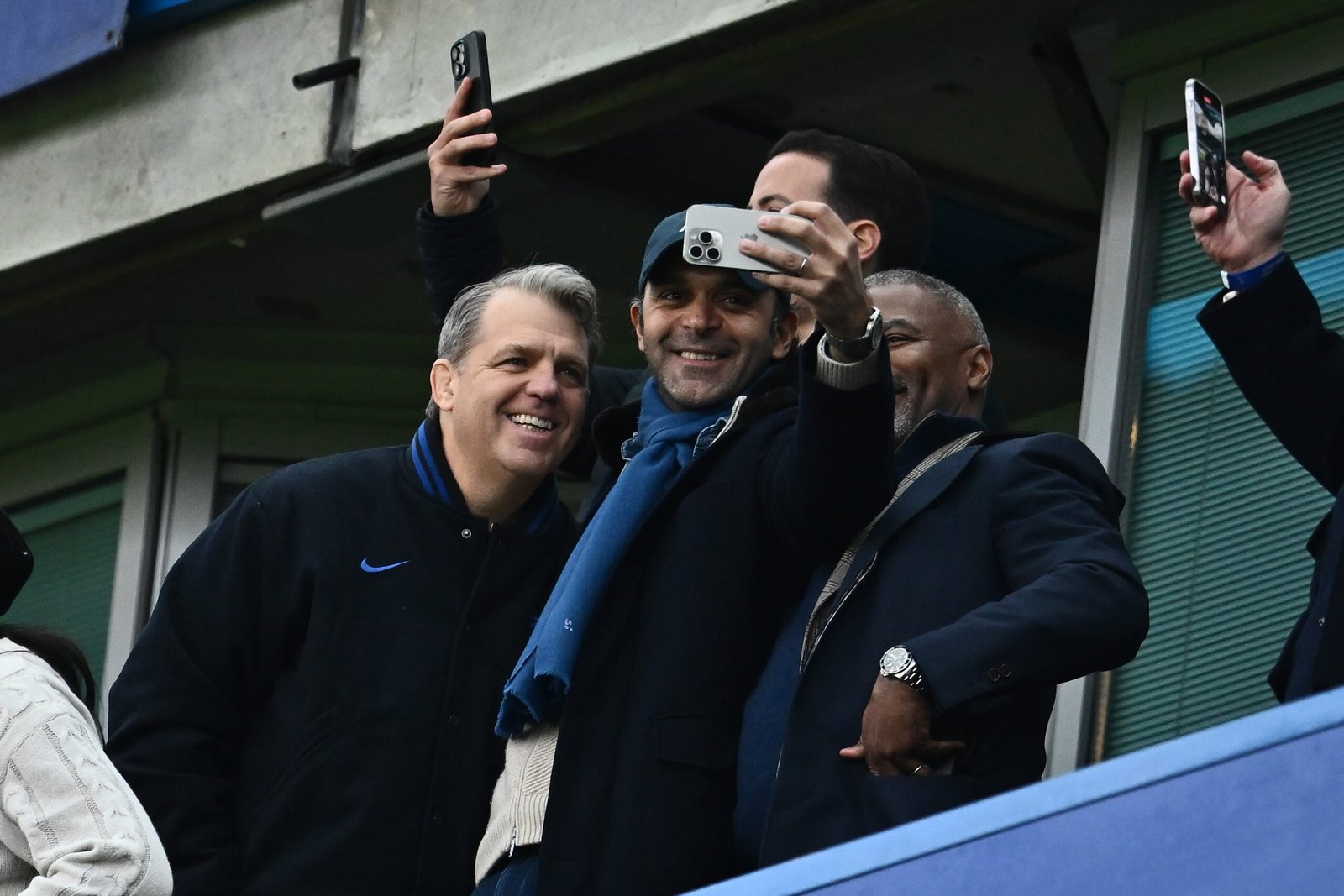
Boehly watched the win over Fulham in mid-January at Stamford Bridge (Sebastian Frej/MB Media/Getty Images)
Both Boehly and Eghbali have other significant business interests. And, after an intense first season since the takeover which saw him work as an interim sporting director, Boehly planned to take more of a step back in 2023-24. Which is why it is usually now Eghbali, Winstanley and Stewart who are most visible at Stamford Bridge, whether up in the stands or venturing into the home dressing room after games.
The hierarchy are content with the hires made to run the club and, after the disruption of the takeover, feel they are in a better position now to move forward. In the months to come, more people will be appointed to work under Winstanley and Stewart in the recruitment department.
Much was made about Chelsea’s apparent reluctance to enter the transfer market in January, the inference being that they were struggling to adhere to the Premier League’s Profit and Sustainability rules (PSR). Yet Chelsea did bid for players, including Club Bruges’ highly-rated Antonio Nusa, who saw a proposed move to Brentford collapse last week.
That failure to add was not seen as disastrous, though, with plans already being drawn up for summer signings — an indication of how confident they are about their PSR position. Players will leave, but Chelsea do not need to sell to buy. The number of ins and outs should be less than in the summer of 2023 (when they did over 30 deals, including loans) as the club believe most of the restructuring of the squad from the Abramovich era has been done.
Tinkering rather than mass change is the strategy from now on.
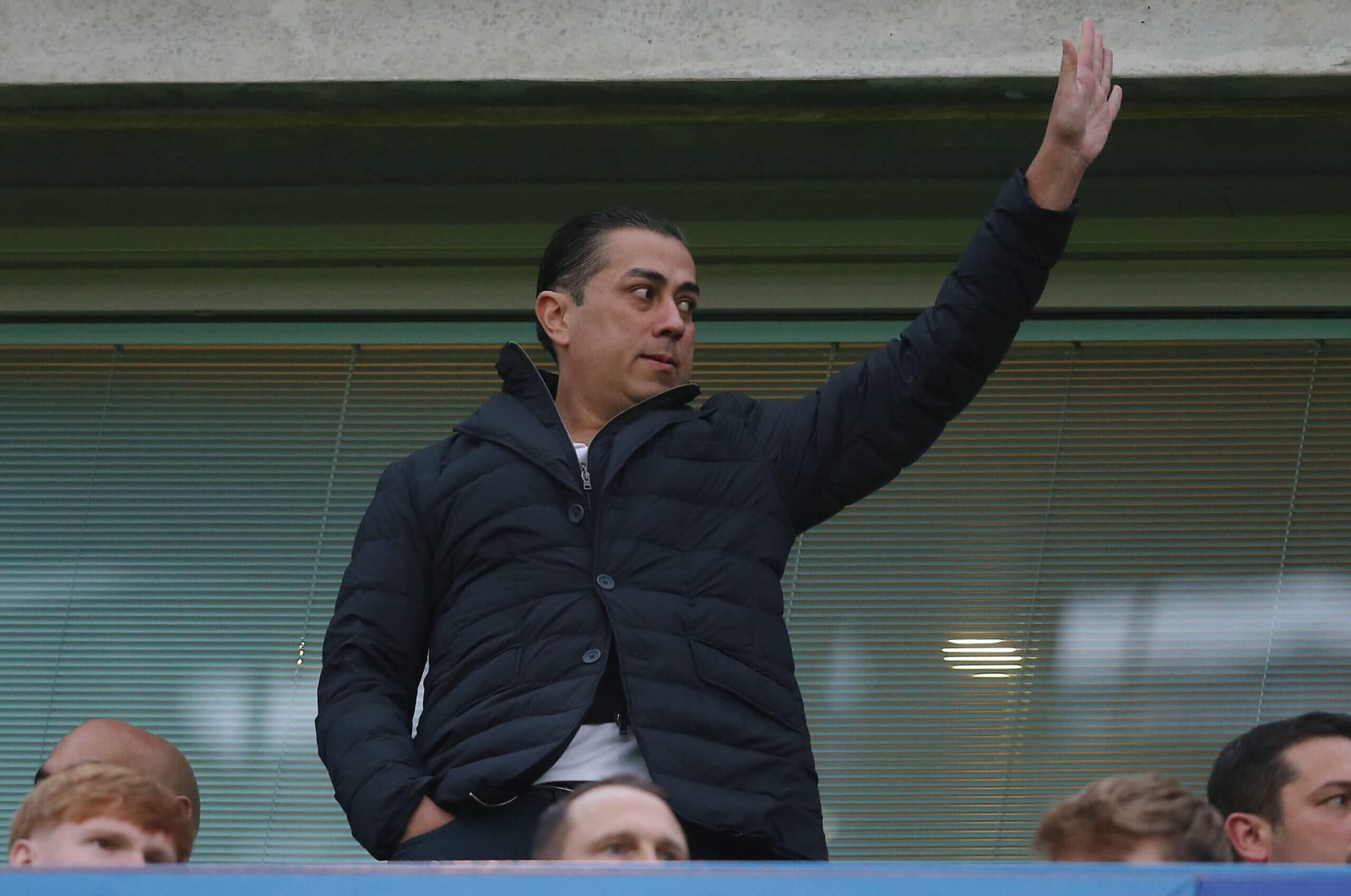
Eghbali in attendance at the game against Sheffield United in December (Crystal Pix/MB Media/Getty Images)
The plan has always been to assess everything, including Pochettino’s position, at the end of the season. That remains the intention and, given the head coach will have 12 months left on his deal in the summer — there is an option for a third year — that stance seems logical, particularly in the context of last season’s trials and tribulations.
Firing Potter in April 2023 did not pay off and the team’s campaign actually unravelled further from there. Chelsea feel it would take a significant downturn in form for a similar decision to be taken over Pochettino.
There is concern about recent performances, results and Chelsea’s league position at a club who still aspire to qualify for European competition via a high finish in the Premier League. The gap to fifth-placed Tottenham yawns at 13 points. But, given the injuries with which his squad have had to contend, faith is retained in Pochettino and his process.
One source has explained to The Athletic that Chelsea’s idea from the outset was to build a squad ready to take advantage of the moment Pep Guardiola and Klopp leave their jobs at Manchester City and Liverpool respectively, while trying to compete on all fronts in the interim. But there was always some allowance for how the youngest group in the Premier League would need time to grow together.
Klopp’s decision to leave Liverpool at the end of this season has come earlier than forecast. Guardiola’s contract expires next year and, while the 53-year-old has indicated he is prepared to sign an extension, Chelsea believe there is a good chance he will not. Therein lies their hope.
But Pochettino will still ultimately be judged on results and how much the players are improving under his guidance, just like any coach should be.
Simon Johnson
What has been the players’ reaction?
Once upon a time, the sight of a Chelsea season veering off the rails under the leadership of an unconvincing head coach would have prompted a conversation between the senior stars memorably referred to by Mikel Jon Obi as “the big guys”: John Terry, Frank Lampard, Didier Drogba and Petr Cech.
All had Abramovich’s ear and, when he canvassed opinion in crisis moments at Cobham, their assessments invariably carried the most weight.
Who would even qualify as “the big guys” in this Chelsea squad? Most have neither the experience nor the personality to assume such a role. Thiago Silva might be the only one and his wife Belle is more publicly vocal than he is. Her tweet calling for change during the Wolves loss has tellingly not been deleted, and it is difficult to avoid the conclusion that the primary target of her criticism was Pochettino.
It’s time to change. If you wait any longer it will be too late 💙💙
— Belle Silva (@bellesilva) February 4, 2024
On-pitch tension between Silva and his head coach has been a recurring theme in recent months. In the second half of the 4-1 win over Tottenham in November, Pochettino spent the best part of a minute after Nicolas Jackson had scored Chelsea’s decisive third goal embroiled in a prolonged and animated argument with the 39-year-old.
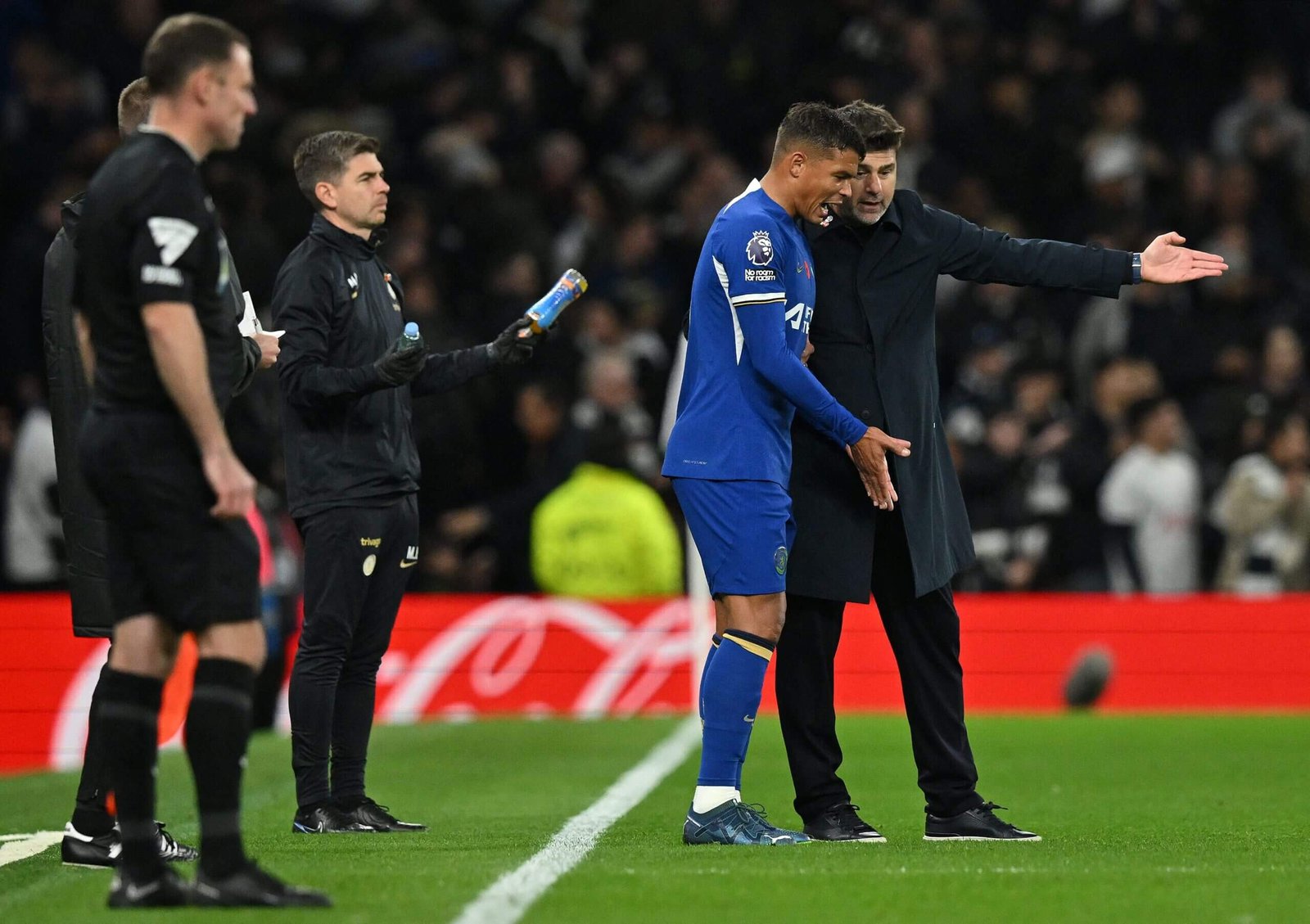
Pochettino instructs Silva on the sidelines at Tottenham (Glyn Kirk/AFP via Getty Images)
A similar exchange almost played out as Cole Palmer celebrated opening the scoring against Wolves on Sunday. A visibly agitated Pochettino tried to get Silva’s attention on the halfway line, but eventually had to summon Enzo Fernandez instead to relay a message after the veteran defender either did not hear or simply did not acknowledge him.
Despite leading the entire Chelsea squad in Premier League minutes played this season, Silva lacks the influence at the highest levels of the club to bring about Pochettino’s departure. This is likely to be his final season at Stamford Bridge, partly because his contract is up and partly because his physical limitations are being exploited with growing regularity by much younger, much quicker opposition attackers.
Beyond him this is a young, callow squad that has spent long stretches of this season without their captain (James) and vice-captain (Ben Chilwell) due to injury. That said, Chelsea’s hierarchy do not feel the team is struggling because the squad lacks experience. It is littered with senior internationals throughout.
Sterling and Chilwell, who struggled notably in last week’s defeats, are two of the oldest members of the group. Inexperience is no excuse.
The injury crisis does finally appear to be easing but, in recent weeks, Pochettino has been keen to stress the challenge of working fit-again players back to peak sharpness in the midst of competitive games. Christopher Nkunku, despite flashes of quality, is not operating at full capacity yet.

Disasi, Gallagher and Fernandez trudge back to the halfway line as Wolves celebrate (Richard Heathcote/Getty Images)
Mutinous it is not, but there is a view within Chelsea that the current first-team group is high on entitlement and low on hunger in some quarters. Some of the new arrivals have privately expressed regret at the long-term contracts they have signed and do not see the grand project that was sold to them in the first place.
Add to that the inconsistency of youth, the pressure of large price tags and the increasingly open disdain of their own supporters, and the result is a toxic mix.
Liam Twomey
Can the fans be appeased?
It was telling that not even a run of five wins in seven matches across all competitions prior to the Liverpool defeat came close to quelling the discontent of Chelsea’s match-going supporters, who voiced their frustrations at times during the close Premier League victories over Crystal Palace, Luton Town and Fulham.
Losing 1-0 to Middlesbrough in the first leg of their Carabao Cup semi-final and, more recently, the eight goals shipped against Liverpool and Wolves in back-to-back defeats, simply brought the roiling anger that many harbour towards virtually every aspect of the Boehly-Clearlake ownership bubbling back to the surface.
Whether it is the £1billion ($1.27bn) in transfer fees committed largely to young and relatively unproven talent, the sharp plunge into Premier League mediocrity, the unpopular price hikes to various aspects of the match-day experience or the broader sense of all the chaos with none of the trophies, Boehly and Clearlake have so far come nowhere near close to delivering the ride of a lifetime Chelsea supporters enjoyed over 19 years under Abramovich.

Many fans voted with their feet on Sunday, while others chanted “Roman Abramovich” (Alex Pantling/Getty Images)
Faith in the football strategy is at an all-time low, with growing calls for Winstanley and Stewart to be held accountable for underachieving or overpriced signings. It is also increasingly difficult to find supporters who trust in Boehly and Eghbali’s ability to preside over a grand Chelsea revival, or even to run the club in line with the values of those who follow it.
The sense of disconnect — from the players, from the coach and from the ownership — runs so deep with many supporters that, while another uptick in results could succeed in changing the complexion a little, it would also be papering over cracks that cannot be fixed by simply winning a few football matches.
A more likely development is that opposition to ownership at matches becomes more organised than a few pointed chants of Abramovich’s name. One obvious trigger point in the coming months will be when Chelsea announce their ticket pricing plans for the 2024-25 season, with many supporters braced for the cost of general-admission season tickets to rise for the first time in more than a decade.
In the meantime, you can expect groans, boos and angry chants to remain the soundtrack to Chelsea’s more difficult days for the foreseeable future.
Liam Twomey
(Top photo: Bradley Collyer/PA Images via Getty Images)
Read the full article here


